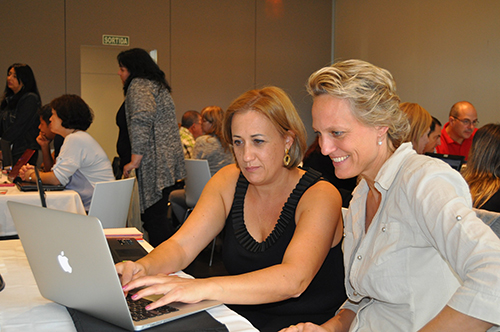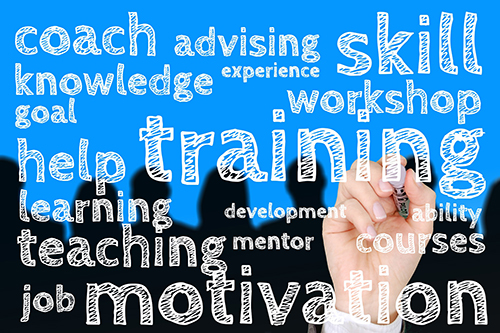Blog Posts | September 7, 2016
Share ThisWebJunction Experience: Blended Learning Strengthens Library Practice
The most effective learning combines work both online and offline.
By Liz Morris
How would you complete this sentence? "I like my online learning to be ____."WebJunction users consistently use adjectives like "relevant," "high-quality," and "convenient" to describe their online learning priorities, and we love to design and deliver resources to meet those needs.

Image from Pixabay.com
Supercharged Storytimes is a recently completed program offered via WebJunction (and funded with an IMLS National Leadership Grant) that highlights our expertise in providing blended-learning. Blended learning is central to many of our long-term programs that engage cohorts of learners over time, such as Strengthening CE Content for Libraries, Outside the Box and our upcoming program to Amplify Libraries and Communities Through Wikipedia.
In the case of Supercharged Storytimes, more than 500 library staff members learned together online how to incorporate research-based early literacy concepts into their storytimes. (The full Supercharged Storytimes course archive is currently available in the catalog).
In designing this program, we were motivated to customize a learning experience that had just the right mix of consistency to allow all participants to work from the same foundation of support and enough flexibility for participants to take action on the learning that would be most useful to their practice. In order to strike this balance over the eight-week learning commitment our participants made, our instructional design prioritized facilitated instruction, peer-engagement, and opportunities to put learning immediately into practice.
Facilitated instruction: When it comes to learning brand new things or even deepening existing knowledge, even the most motivated learner can benefit from guidance on where to focus their efforts. Through Supercharged Storytimes, facilitated support was provided through online webinars including early literacy and library subject matter experts. This facilitation was provided by project team members in a few ways.

Image from Pixabay.com
Webinars were offered live and made available as recordings so that participants could review them on their own time. Guidance on next steps for learning was reinforced through these sessions, as well as through regular emails and consistent postings in the shared learning space (known as Supercharged Central), so that all participants got the same message about activities they could focus on each week, activities such as reading certain articles or practicing early literacy asides with parents. Participants were encouraged to focus on the activities that would be most relevant to their work, rather than try to do everything at once.
One participant described why this flexibility is so important, sharing that, "I really enjoy the flexibility of scheduling. As a children's librarian I find that my schedule changes depending on the needs of parents and children in my library—sometimes homework help or supervising large groups of kids who are playing takes over my other commitments. Having the flexibility to go back to my work when I want is fantastic for me."
Project team members and state library collaborators monitored online discussion forums related to core learning objectives, so that, if or when participants ran into challenges, support would be easily available. Frequently, other participants would jump in and respond to questions before project team members could do so, highlighting the power of peers in blended learning environments.
Peer-engagement: In our programming, we operate on the assumption that our learners are the experts. They have expertise about their communities, their libraries and their own experiences that they bring to the learning environment. Our role is to help them build from that expertise as they learn something new and encourage them to share insights with others. One participant noted, "I think we learn from our peers best. They motivate us and provide the "spark" to try new things (tried and true in their storytimes)." We'd have to agree!
In addition to encouraging participants to respond to each other's feedback in the online discussion forums, the Supercharged Storytimes online webinars included plenty of time for active chat and idea and resources sharing amongst participants. Additionally, participants were introduced to best practices in peer-mentoring in order to sustain relationships originally built online beyond the timeline of this program.
Putting learning into practice: We call this instructional approach blended learning because a lot of the actual learning happens offline while participants apply what they've learned to their daily work and take the time to reflect on what worked or what might have been challenging about that application

Image from Pixabay.com
In the case of Supercharged Storytimes, participants were encouraged to intentionally incorporate early literacy concepts such as alphabetic knowledge and phonological awareness into their storytimes and engage with children and parents on these topics. Participants strengthened their practice through repetition, and through adding in more concepts over time.
One participant shared an evolution in their practice during the eight-weeks of Supercharged Storytimes, noting, "I tended to approach storytime with, 'What stories am I going to tell?' and now I focus on, 'What lesson am I trying to get across?' It made me reevaluate how I look at certain books and how I could use them differently."
Together, the facilitated instruction, peer support and opportunities to put learning into practice offered through a blended learning model can lead to sustained impact for library staff learners and their patrons. As one library director noted, this approach, "provides high-quality content convenient to my busy schedule and helps me identify individuals who can further help me take what I am learning online and deliver it successfully in my community if questions arise."
While this approach does require a significant investment of time and resources on behalf of the providers and the participants, it helps learners integrate new knowledge and skills with a reliable learning support system that can keep them motivated and move forward in service to their communities.
Liz Morris is a project manager with WebJunction, a program of OCLC
